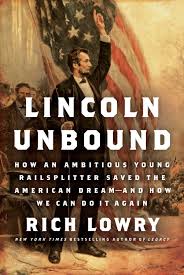 Rich Lowry, Lincoln Unbound: How an Ambitious Young Railsplitter Saved the American Dream—And How We Can Do It Again (New York: Broadside Books, 2013). $26.00, 288 pages. Hardcover / Kindle
Rich Lowry, Lincoln Unbound: How an Ambitious Young Railsplitter Saved the American Dream—And How We Can Do It Again (New York: Broadside Books, 2013). $26.00, 288 pages. Hardcover / Kindle
Two score and seventeen years ago, historian David Herbert Donald noted the tendency of politicians to appropriate Abraham Lincoln’s name and words in support of their preferred policies. Borrowing a phrase from Illinois Republican pol Everett Dirksen, Donald titled this phenomenon, “getting right with Lincoln.”
Between the Civil War and the dawn of the New Deal, this appropriation was done solely by Republicans (or ex-Republican Bull Moosers like Teddy Roosevelt). Then, in 1932, casting about for a usable past, Teddy’s cousin Franklin began appropriating Lincoln’s name and words for Democratic Party initiatives. Since FDR, progressives have routinely claimed Lincoln as one of their own. Indeed, in 2008, Illinois Senator Barack Obama verged on presenting himself as Lincoln redivivus.
Lincoln Unbound by National Review editor Rich Lowry sets out to reclaim Lincoln for the Grand Old Party by putting Lincoln’s ideology and policies in biographical perspective. Raised dirt-poor on the American frontier, Lincoln dreamed of escaping the hard, dreary life of working the land. Like many other young men on the make, he turned to Henry Clay’s Whig Party, whose “American system” of moral improvement, infrastructure development, and protectionist policies aimed to create a new America, unlike the vision of self-sufficient yeoman farmers so beloved by partisans of Jefferson and Jackson. Lincoln the Railsplitter became Lincoln the Railroad Supporter. Indeed, he seemed never to have found an industrial innovation he didn’t like.
He never liked slavery, however. Like most Whigs, he was content to attempt to limit the extent of slavery. Henry Clay—Lincoln’s “beau ideal of a statesman”—had negotiated the Missouri Compromise of 1820, limiting slavery to the South (Missouri excepted). The Kansas-Nebraska Act of 1854, negotiated by Stephen Douglass, had effectively repealed the Compromise and allowed new states to decide, through “popular sovereignty,” whether they would be slave or free. All this negotiating came to naught, however, when Roger Taney’s Supreme Court issued its ruling in Dred Scott, effectively legalizing slavery in all states of the Union and pushing the country to war.
Lincoln, whose national political career had been limited to a single ineffective term in the House of Representatives, battled Stephen Douglass for the Illinois Senate seat in 1858. In their famous seven debates, he ridiculed the notion of popular sovereignty, critiqued the Supreme Court’s ruling, and argued that whether whites and blacks were equal, they were equal before the law. And he lost. But his arguments brought him national fame, and in 1860 when he won the presidential election as a Republican and led the Union through four long years of war to victory and emancipation.
Lowry’s book narrates Lincoln’s life and ideas succinctly and winsomely. This narration occupies the vast majority of the book. It is the final chapter, appropriating Lincoln’s ideas for today, that will be the most controversial for many readers. Lowry writes:
So, what would Lincoln do today? His essential formula wouldn’t have to change much: Economic growth. Policies to enhance the market and ensure that it is as fluid and flexible as possible. Education. An ethic of self-reliance, free of control or dependence on others. And a commitment to order and self-regulating conduct. We should be a strenuous society that demands individual exertion and rewards it, and that is open to all, without favor or prejudice. We should be a country where you can make your way and you have to make your way (p. 207).
How to do that specifically? Lowry offers a raft of “my own policy preferences,” quickly adding, “without presuming Lincoln would have necessarily endorsed any of them” (p. 208).
And thus the problem of getting right with Lincoln. We know who Lincoln was, what he believed, what policies he pursued and when in power enacted. But we cannot “necessarily” know what Lincoln would do today, because our times are not his. And perhaps Lincoln’s ideas would’ve evolved with changing circumstances
As much as I agreed with many of Lowry’s proposals, indeed seeing them as logical extensions of Lincoln’s ideas, I can’t help but think that what America and American conservatism need today is not Lincoln redivivus—or the Second Coming of Ronald Reagan—but similar Declaration-loving, Constitution-following politicians who propose sound solutions to the problems we fact today, and work successfully to see them enacted. Personally, as much as I love all things Lincoln, I’d rather see that kind of politician unbound.
P.S. If you found my review helpful, please vote “Yes” on my Amazon.com review page.

